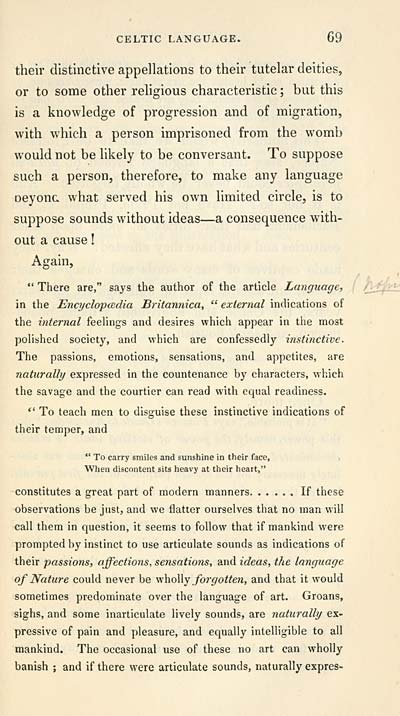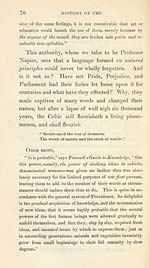Download files
Complete book:
Individual page:
Thumbnail gallery: Grid view | List view

CELTIC LANGUAGE. 69
their distinctive appellations to their tutelar deities,
or to some other religious characteristic ; but this
is a knowledge of progi'ession and of migration,
with which a person imprisoned from the womb
would not be likely to be conversant. To suppose
such a person, therefore, to make any language
oeyonc what served his own limited circle, is to
suppose sounds without ideas — a consequence with-
out a cause !
Again,
" There are," says the author of the article Language,
in the EncyclopcBdia Britannica, " external indications of
the internal feeHngs and desires which appear in the most
polished society, and which are confessedly instinctive.
The passions, emotions, sensations, and appetites, are
naturally expressed in the countenance by characters, which
the savage and the courtier can read with equal readiness.
*' To teach men to disguise these instinctive indications of
their temper, and
" To carry smiles and sunshine in their face,
When discontent sits heavy at their heart,"
constitutes a great part of modern manners If these
observations be just, and we flatter ourselves that no man will
call them in question, it seems to follow that if mankind were
prompted by instinct to use articulate sounds as indications of
their passions, affections, sensations, and ideas, the language
of Nature could never be yvhoWy forgotten, and that it would
sometimes predominate over the language of art. Groans,
sighs, and some inarticulate lively sounds, are naturally ex-
pressive of pain and pleasure, and equally intelligible to all
mankind. The occasional use of these no art can wholly
banish ; and if there were articulate sounds, naturally expres-
their distinctive appellations to their tutelar deities,
or to some other religious characteristic ; but this
is a knowledge of progi'ession and of migration,
with which a person imprisoned from the womb
would not be likely to be conversant. To suppose
such a person, therefore, to make any language
oeyonc what served his own limited circle, is to
suppose sounds without ideas — a consequence with-
out a cause !
Again,
" There are," says the author of the article Language,
in the EncyclopcBdia Britannica, " external indications of
the internal feeHngs and desires which appear in the most
polished society, and which are confessedly instinctive.
The passions, emotions, sensations, and appetites, are
naturally expressed in the countenance by characters, which
the savage and the courtier can read with equal readiness.
*' To teach men to disguise these instinctive indications of
their temper, and
" To carry smiles and sunshine in their face,
When discontent sits heavy at their heart,"
constitutes a great part of modern manners If these
observations be just, and we flatter ourselves that no man will
call them in question, it seems to follow that if mankind were
prompted by instinct to use articulate sounds as indications of
their passions, affections, sensations, and ideas, the language
of Nature could never be yvhoWy forgotten, and that it would
sometimes predominate over the language of art. Groans,
sighs, and some inarticulate lively sounds, are naturally ex-
pressive of pain and pleasure, and equally intelligible to all
mankind. The occasional use of these no art can wholly
banish ; and if there were articulate sounds, naturally expres-
Set display mode to: Large image | Transcription
Images and transcriptions on this page, including medium image downloads, may be used under the Creative Commons Attribution 4.0 International Licence unless otherwise stated. ![]()
| Early Gaelic Book Collections > Blair Collection > History of the Celtic language > (75) |
|---|
| Permanent URL | https://digital.nls.uk/76179434 |
|---|
| Description | A selection of books from a collection of more than 500 titles, mostly on religious and literary topics. Also includes some material dealing with other Celtic languages and societies. Collection created towards the end of the 19th century by Lady Evelyn Stewart Murray. |
|---|
| Description | Selected items from five 'Special and Named Printed Collections'. Includes books in Gaelic and other Celtic languages, works about the Gaels, their languages, literature, culture and history. |
|---|

